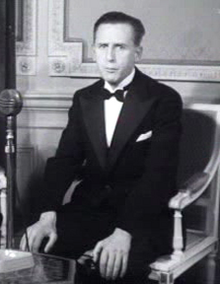William Haley: Difference between revisions
No edit summary |
added a published works and a pseudonym |
||
| Line 21: | Line 21: | ||
Early in his career on the ''[[Manchester Evening News]]'', Haley was found to be too shy to work as a reporter. He was then transferred to [[Copy editing|subediting]].<ref>Harold Evans, ''Essential English for Journalists, Editors and Writers'' 2000 p.10</ref> He rose through the ranks becoming director of [[Guardian Media Group|Manchester Guardian and Evening News, Ltd]] after 8 years.<ref name=Britannica>{{cite web |url=http://www.britannica.com/EBchecked/topic/252356/Sir-William-Haley |title=Sir William Haley |accessdate=12 July 2012}}</ref> |
Early in his career on the ''[[Manchester Evening News]]'', Haley was found to be too shy to work as a reporter. He was then transferred to [[Copy editing|subediting]].<ref>Harold Evans, ''Essential English for Journalists, Editors and Writers'' 2000 p.10</ref> He rose through the ranks becoming director of [[Guardian Media Group|Manchester Guardian and Evening News, Ltd]] after 8 years.<ref name=Britannica>{{cite web |url=http://www.britannica.com/EBchecked/topic/252356/Sir-William-Haley |title=Sir William Haley |accessdate=12 July 2012}}</ref> |
||
He served as [[Director-General of the BBC|Director-General]] of the [[British Broadcasting Corporation|BBC]] from 1944 to 1952 and from 1952 to 1966 he was editor of ''[[The Times]]''. While at the BBC he created the Third Programme, now known as [[BBC Radio 3]].<ref name="New York Times">{{cite web |url=http://www.bbc.co.uk/pressoffice/keyfacts/stories/director_generals.shtml#haley |title=Key Facts: Director-Generals |accessdate= 12 July 2012}}</ref> He was made [[Knight Commander of the Order of St. Michael and St. George]] in 1946. |
He served as [[Director-General of the BBC|Director-General]] of the [[British Broadcasting Corporation|BBC]] from 1944 to 1952 and from 1952 to 1966 he was editor of ''[[The Times]]''. At ''[[The Times]]'' he wrote a series of light-hearted bookish articles under the pseudonym 'Oliver Edwards.' These articles were published in 1957 by Heinemann as 'Talking of Books.' While at the BBC he created the Third Programme, now known as [[BBC Radio 3]].<ref name="New York Times">{{cite web |url=http://www.bbc.co.uk/pressoffice/keyfacts/stories/director_generals.shtml#haley |title=Key Facts: Director-Generals |accessdate= 12 July 2012}}</ref> He was made [[Knight Commander of the Order of St. Michael and St. George]] in 1946. |
||
He was editor in chief of ''[[Encyclopædia Britannica]]'' from January 1968 until resigning in April 1969 in an editorial dispute over how to adapt the work to new readers. It was reported that younger executives (including the company's president, Charles E. Swanson) wanted to introduce livelier materials, while Haley favoured the traditional approach and an expansion in size.<ref>Henry Raymont, "Encyclopaedia Britannica Feud Seen", ''New York Times'', April 20, 1969</ref> |
He was editor in chief of ''[[Encyclopædia Britannica]]'' from January 1968 until resigning in April 1969 in an editorial dispute over how to adapt the work to new readers. It was reported that younger executives (including the company's president, Charles E. Swanson) wanted to introduce livelier materials, while Haley favoured the traditional approach and an expansion in size.<ref>Henry Raymont, "Encyclopaedia Britannica Feud Seen", ''New York Times'', April 20, 1969</ref> |
||
Revision as of 09:39, 5 February 2015
William Haley | |
|---|---|
 | |
| Born | William John Haley 24 May 1901 |
| Died | 6 September 1987 (aged 86) |
| Education | Cambridge University Dartmouth College |
| Occupation(s) | Editor and director-general of the BBC |
| Spouse | Susan Gibbons |
Sir William John Haley, KCMG (24 May 1901 – 6 September 1987) was a British newspaper editor and broadcasting administrator.
Biography
Haley grew up on the island of Jersey and attended Victoria College. In 1918 he began to study journalism, and in 1921 he secured his first newspaper employment at The Times, eventually being stationed in Brussels.[1]
Early in his career on the Manchester Evening News, Haley was found to be too shy to work as a reporter. He was then transferred to subediting.[2] He rose through the ranks becoming director of Manchester Guardian and Evening News, Ltd after 8 years.[1]
He served as Director-General of the BBC from 1944 to 1952 and from 1952 to 1966 he was editor of The Times. At The Times he wrote a series of light-hearted bookish articles under the pseudonym 'Oliver Edwards.' These articles were published in 1957 by Heinemann as 'Talking of Books.' While at the BBC he created the Third Programme, now known as BBC Radio 3.[3] He was made Knight Commander of the Order of St. Michael and St. George in 1946.
He was editor in chief of Encyclopædia Britannica from January 1968 until resigning in April 1969 in an editorial dispute over how to adapt the work to new readers. It was reported that younger executives (including the company's president, Charles E. Swanson) wanted to introduce livelier materials, while Haley favoured the traditional approach and an expansion in size.[4]
Sir William died in a nursing home in Jersey.[3]
Sources
- ^ a b "Sir William Haley". Retrieved 6 June 2012. Cite error: The named reference "Britannica" was defined multiple times with different content (see the help page).
- ^ Harold Evans, Essential English for Journalists, Editors and Writers 2000 p.10
- ^ a b "Key Facts: Director-Generals". Retrieved 12 July 2012. Cite error: The named reference "New York Times" was defined multiple times with different content (see the help page).
- ^ Henry Raymont, "Encyclopaedia Britannica Feud Seen", New York Times, April 20, 1969
